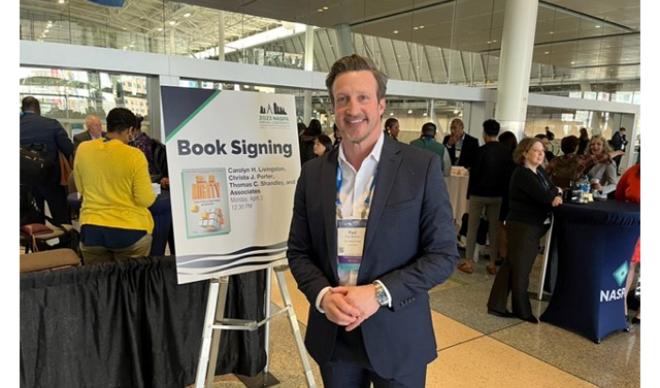
During his professional career, Paul Bennion has attended many professional conferences. But an April trip to Boston to participate in the National Association of Student Personnel Administrators (NASPA) was a little bit different.
He wasn’t there to give or attend a presentation. Bennion, Vice President for Student Affairs and Dean of Students at The College of Idaho, was invited to the Student Affairs Administrators on Higher Education conference to participate in a book signing.
The book is titled “Small and Mighty: Student Affairs at Small Colleges and Universities” by Livingston, Porter, Shandley, and Associates (2023). Bennion co-authored a chapter on innovations in the small college/university setting with Sandy Olson-Loy, Vice Chancellor of Student Affairs at the University of Minnesota-Morris, an institution with about 2,500 students located two hours west of Minneapolis. The two knew each other professionally before beginning this project but worked closely to produce their chapter in the book.
“What a wonderful opportunity. She’s an incredible professional and person,” Bennion said of his co-author. “It turned out well to have a writing partner that I didn’t really know. We ended up collaborating really well together.”
No specific examples from the College or Minnesota-Morris were used, but Bennion and Olson-Loy used their experience to discuss philosophies and to cite instances from other institutions of similar size.
“There are really two types of innovation,” Bennion said of the topic. “There’s sustainable innovation and then there’s disruptive innovation.”
He explained that sustainable innovation is common. It’s incremental change and development through time to existing offerings and programs at a school to stay current or even ahead of the curve. Disruptive innovation is less common and is generally centered around times of crisis or difficulty. It could be financial struggles at the school or times of strife or struggle on campus.
“That’s where you’re really introducing something new or maybe completely abandoning something,” he continued. “It can be a seismic shift in what you’re doing.”
The book is 15 chapters long and most chapters had co-authors, similar to Bennion and Olson-Loy. It was developed by and intended for leaders in higher education, but the book is readily available on websites like Amazon for anyone who has an interest. Bennion has published many articles before but this was his first venture into the realm of book-publishing … and book-signing.
“A lot of people came by, supporters of the book and people who read the book,” Bennion said of the experience. “It was a lot of colleagues and friends but also a lot of new people. It was fun.”
The College of Idaho has a 132-year-old legacy of excellence. The College is known for its outstanding academic programs, winning athletics tradition, and history of producing successful graduates, including eight Rhodes Scholars, three governors, and countless business leaders and innovators. Its distinctive PEAK Curriculum challenges students to attain competency in the four knowledge peaks of humanities, natural sciences, social sciences, and a professional field—empowering them to earn a major and three minors in four years. The College’s close-knit, residential campus is located in Caldwell, where its proximity both to Boise and to the world-class outdoor activities of southwest Idaho’s mountains and rivers offers unique opportunities for learning beyond the classroom. For more information, visit www.collegeofidaho.edu.